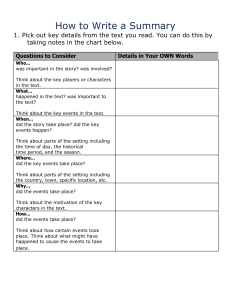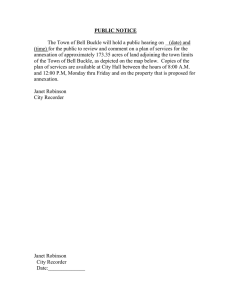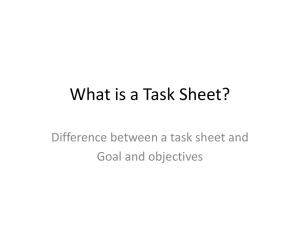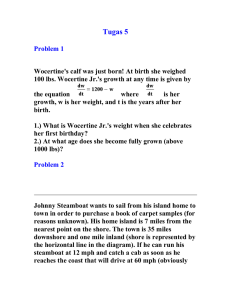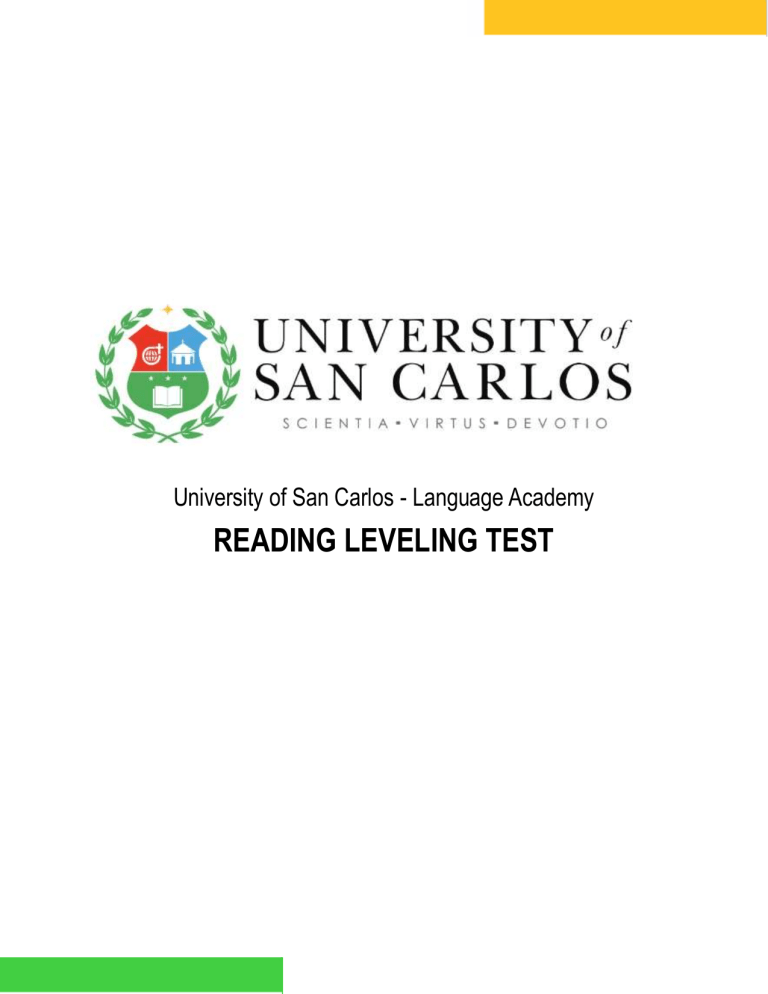
University of San Carlos - Language Academy READING LEVELING TEST INFORMATION FOR ALL TEST TAKERS: The Reading Leveling test consists of five (5) test parts that will assess your understanding of the reading comprehension. The test will also evaluate the progress of your reading skills. You are required to answer the exam for 40 MINUTES only. Once the time is up, you must hand over the paper to the instructor. Write your name and the date today. Read the instructions and the texts carefully, and answer all the questions. *No use of cellphones and dictionaries while taking the test. Name: __________________________________ Date Taken: _______________ READING PASSAGE 1 QUESTIONS 1-5 Read the paragraphs and answer the questions that follow. What Do You Do with Your Free Time? Johnny completed his first year of college when he was almost 19 years old. He has a lot of spare time right now because he is on vacation. Although Johnny enjoys his free time, he does have a problem. Since he is a student, he has no money to spend. He feels bored when he has a lot of free time but no money in his wallet. Johnny spends two hours at the gym every morning, including travel time and the post-exercise shower. He spends his afternoon reading for an hour. He also enjoys viewing historical documentaries because he studies history, which is another hobby he engages in. Every four or five days he spends one and a half hours watching documentaries. Despite the things he does on a regular basis, Johnny gets bored and plays video games for hours when he's not at the gym or reading a book. Johnny feels guilty about playing video games despite how much he enjoys them. It is difficult for Johnny to find more productive activities, despite his preference. Johnny lives in a little town, therefore there aren't many things to do there, which is a shame. ENCIRCLE THE LETTER that corresponds to the question number. 1. How old is Johnny? a. 18 years old b. 19 years old c. 17 years old d. 16 years old 2. What issue did Johnny have, with all the free time he has? a. he still has to attend school b. he hasn’t finished his university c. he doesn’t have money to spend d. he wanted to buy a video game but his mother wouldn’t give him money 3. How did Johnny spend his free time? a. he goes to the gym b. he reads books c. he watches documentaries d. all of the above 4. What other activity did he do during his free time? a. he goes shopping in a mall b. he buys video games c. he plays video games d. he does nothing 5. What did Johnny want for himself? a. to be focus on his schooling b. to be grateful that he has something to do in his life c. he wants to be more productive d. to watch more documentaries Resource: https://test-english.com/reading/a1/what-do-you-do-with-free-time/ READING PASSAGE 2 QUESTIONS 6-10 Read the short article about Janet’s daily routine. Answer the following questions. WRITE THE CORRECT LETTER on the space provided. The Daily Routines of a Sportswoman Janet is an athlete, and she wakes up at 4:30 am every weekday morning. She spends the first 30 minutes reading and then 15 minutes meditating. At 5:15 am Janet checks her email for only 30 minutes and then goes for her first run of the day. She runs for an hour and a half along the lake near her house. After running, Janet has a shower and then prepares breakfast, which is usually cereal and fruit. However, she occasionally has a less healthy breakfast. She usually finishes breakfast at around 8 am. If it is a weekday, she always leaves the house at 8:20 and goes to training. Her training starts at 9 am, and she needs 30 minutes to drive to the gym. She trains for 3 hours with her team and then goes home for lunch. She always eats a very big and healthy lunch. As soon as she finishes lunch, she has a nap for one hour. After her nap, she likes to go for a walk around the lake and look at nature. She sometimes reads or meditates at the lake in the afternoon. In the evening, during the week, she meets up with friends. Most of her friends are athletes too, so they have a lot to talk about. She typically goes to bed at 9 pm because she prefers to be awake in the morning than at night. She sometimes falls asleep listening to music, but she never watches the television or reads anything on her tablet. She always makes sure her alarm is set and is almost always asleep by 9:45 pm. __________ 6. When Janet wakes up in the morning, what is her first schedule? a. a total of 45 minutes spending on reading and practicing mediation b. eats breakfast c. goes training d. doing a run __________ 7. Which statement is NOT CORRECT? a. Janet eats breakfast at around 7:30 A.M. b. Janet doesn’t eat breakfast. c. Janet wakes up early and spends her first few leisure time reading and meditating. d. Janet enjoys walking around and meditating at the lake. __________ 8. What other daily activities did she do? a. Taking a nap for an hour b. Going for a walk around the lake and enjoy nature c. Meeting up with friends in the evening d. All of the above __________ 9. What time did Janet fall asleep? a. 9 P.M b. 10 P.M c. 9:45 P.M d. 9:50 P.M __________ 10. What time did Janet arrive in the gym? a. 9 A.M b. 8:30 A.M c. 8:50 A.M d. None of the above Resource: https://test-english.com/reading/a1/daily-routines-sportswoman/ READING PASSAGE 3 QUESTIONS 11-15 Read the article about the “Return to River Town”, and answer the item questions that follow. Return to River Town From 1996 to 1998, Peter Hessler was a Peace Corps volunteer. He was an English teacher in China. He worked in a region near the Yangtze River. It is now part of the Three Gorges Dam*. Last year, he returned to the region on a visit. I am in the White Crane Ridge Underwater Museum. It’s a very strange museum – it’s under 40 metres of water on the side of the Three Gorges Dam. The director of the museum is Huang Dejian. I knew him before the museum existed and before the Three Gorges Dam existed. I taught English at the local college in the town of Fuling. Fuling was quiet and isolated. There wasn’t a motorway or a railway line. The river ferry to the city (Chongqing) took seven hours. Foreigners were very rare. When I ate my lunch in the town centre, a crowd often came to watch me. The city had one escalator and one nightclub. There weren’t any traffic lights. I didn’t know anybody with a car. From 1996 to 1998, I worked at Fuling Teachers College. My students came from rural homes but they wanted to be English teachers. I learned many things from my students. They helped me to understand people’s experiences of moving from the countryside to big cities. My students didn’t have much money, but they were optimistic and they had opportunities. During my visit, I meet about 15 of my old students. They tell me about their old classmates. Many of them have left Fuling. One is a Communist Party official in Tibet, another started a taxi company and became a millionaire. One woman is a radio presenter. Another now teaches English to the children of rich factory owners. My old students are interested in analyzing their society. One student, Emily, tells me about her rich cousin. She says that he is richer now but he isn’t happier. My last meeting on this visit is with Huang Zongming and his brother Zongguo. When I lived here, they were fishermen. When the first stage of the dam was completed, they left their home. I was sure that their lives were changed forever. But now I discover that everything is almost the same for them. They are still fishermen. The fishing on the river is still good. The dam has not changed some things in Fuling. Match the vocabulary which is found in the article “Return to River Town” with the correct definition. WRITE THE LETTER on the space provided. __________ 11. traffic lights __________ 12. isolated a. a business organization that makes money by selling things or services b. a large building where machines are used __________ 13. railway line __________ 14. company __________ 15. motorway to make things c. they control the traffic d. the metal tracks that trains travel on e. a long, wide road that is for cars to travel fast and for long distances f. a long way away from large towns and difficult to reach Resource: https://www.ngllife.com/return-river-town READING PASSAGE 4 QUESTIONS 16-20 Read the article about “Siberia’s Medical Train”, and answer the questions that follow. Siberia’s Medical Train The famous Trans-Siberian railway line goes from Moscow to Vladivostok, but there’s another railway line about 650 kilometres north of the Trans-Siberian. This is the Baikal-Amur Mainline (BAM). A special train, the Matvei Mudrov medical train, travels along its 4,000 kilometres. There are usually between twelve and fifteen doctors on the train. The train stops for a day at places along the BAM. The people who live in small towns and villages come to the train for medical attention. There are no doctors or hospitals in their towns or villages. For these patients, their health centre is on the train. The Matvei Mudrov was named after a Russian doctor in the nineteenth century. Nowadays, the Matvei Mudrov visits each town or village on the BAM twice a year. In the village of Khani (population 742), the patients include a man with two broken ankles and a teenage girl. She had appendicitis a month ago and she was lucky to travel to a town three hours away for an operation. The Matvei Mudrov doesn’t have any equipment to do operations. The doctors can diagnose their patients’ medical problems and recommend treatment and medicines. The train has a laboratory for blood and urine tests and a number of medical testing machines. The patients like the doctors on the train. They say they are honest and good at their jobs. Next stop is a town called Berkakit. About 4,000 people live here. There is a queue to see the doctors. Mikhail Zdanovich is waiting for his turn. He’s 61 years old and he came to Berkakit in 1976. At the time, only about a hundred young people lived in Berkakit. It was a new town. Zdanovich met a woman who worked at the town bakery. They married and stayed in the town. When Zdanovich walks into the doctor’s office she says ‘Oh, Mikhail, I recognised your voice.’ He has a problem in his shoulder. The doctor writes a letter to say that he can’t work, he must have an operation. He leaves, happy, and then he returns a few minutes later. He brings freshly cooked pies and some goat’s milk. For the people who live in this remote part of Russia, the Matvei Mudrov is more than a medical train. It’s a social connection to the community of their country. Identify the statement on each number that corresponds to the reading passage 3 above. Write TRUE if the statement is true, write FALSE if the statement is not true, and write NOT GIVEN if the statement is not mentioned in the article. Write your answer on the space provided. _______________ 16. Since the railways were shut down and the doctors weren't allowed to provide medical care to the villagers, it was thought that the Matvei Mudrov did not actually travel to a small town or the village. _______________ 17. The doctors can make recommendations for treatment and medications after diagnosing their patients' medical conditions. There are several medical diagnostic devices on board, as well as a lab for performing blood and urine tests. The patients aboard the train enjoy the doctors. They claim to be trustworthy and competent in their work. _______________ 18. The doctor notifies him in writing that he cannot work and must have surgery. He happily departs before coming back a short while later. He also delivers some goat milk and freshly baked pies. _______________ 19. In small towns and villages, they did have doctors and hospitals providing medical attention to the villagers. _______________ 20. The Matvei Mudrov is more than just a medical train to the people who reside in this isolated region of Russia. It serves as a social link to the nation's community. The medical train, run by Matvei Mudrov, chose to cease operations after many years of treating patients in rural towns and villages due to financial difficulties. Resource: https://www.ngllife.com/siberias-medical-train READING PASSAGE 5 QUESTIONS 21-30 Read the text and choose the sentences that best fit the gap. WRITE THE CORRESPONDING LETTER on the space provided. Have We Taken Security Too Far? What’s the difference between a medical student and a convict? The answer: A convict doesn’t pay $50,000 a year for the privilege of being fingerprinted and patted down. I am referring, of course, to the increasingly stringent security measures that have come to characterize modern educational testing. As student evaluation techniques have migrated from face-to-face assessment to computer-based exams administered in dedicated testing centers, (21) ___________. I recently interviewed a group of fourth-year medical students who had just taken Step 2 of the United States Medical Licensing Clinical Knowledge Examination at test-administration centers. Students must pass the exam to obtain (22) __________, and had devoted nine hours to the single-day exam, which consists of eight sections of 40 to 45 questions each. Over the day, they received a total break time of 45 minutes. Each of the students had paid $560 for the privilege, and (23)__________ in gaining admission to competitive medical specialties. So, anxiety tends to run high. This inevitable anxiety is compounded by Checkpoint Charlie-esque security measures. IDs are checked. Each student wears a (24) ________ throughout the day. Students are fingerprinted each time they enter and exit the testing room (up to 16 times). They are patted down and asked to (25) _______. If they wear a jacket or sweater into the exam room, they cannot take it off. They are warned that they will be under constant camera surveillance. One of the students, a former U.S. marine, said he had found the entire atmosphere of the exam eerily familiar. He had served in Iraq, helping to preside over the return of (26) __________ after the city’s recapture by U.S. forces. “It was weird,” he said. “They were using many of the exact same procedures and equipment we used in Fallujah. It took so long for them to verify identities that you almost didn’t dare leave the room, for fear you couldn’t get back in time. I finally had to show one of the examiners how to do it properly.” Of course, these techniques are not merely for medical students. Aspiring accountants and architects, students sitting for the GRE, and (27) ______________ companies are all subject to these medieval measures. Some might say that a high-security approach to testing students is not only necessary but laughable. In the case of medical testing, (28) ___________, and we cannot afford to place it in the hands of physicians who might have succeeded through academic dishonesty. Who would want a loved one to be cared for by a physician who had cheated on the medical-licensing exam? As public policy, exam hawks argue, we should demand the very (29) _____ in all such testing. But perhaps we have gone overboard. After all, the core of the patient-physician relationship is trust. The Hippocratic Oath, which has shaped the ethics of medicine for many centuries, enjoins the physician to respect patients’ (30)__________ and to always put each patient’s interests first. We entrust to our physicians all sorts of matters we would not share with anyone else---private details of our health and personal relationships, access to intimate parts of our bodies, sometimes even our lives. We want to trust our physicians. No one is arguing that security is unnecessary, but perhaps we haven’t quite yet found the sweet spot. A. privacy and dignity B. leading to heightened precautions around exam security C. inhabitants to Fallujah D. prospective employees of Silicon Valley E. the health of the nation is a vital resource F. roll up their pants legs and pull their pockets inside-out. G. scoring well is an important factor H. highest security I. unique number on his or her shoulder J. a medical license Resource: https://test-english.com/reading/b2/have-we-taken-security-too-far/
